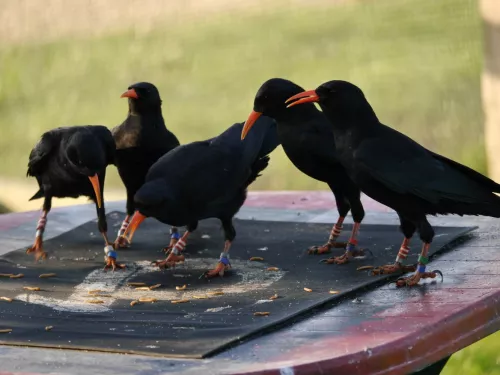
Nourishing food
Providing essential, nutritious food for growing chough chicks and breeding pairs, ensuring they stay strong and healthy in the aviary and rearing sites.
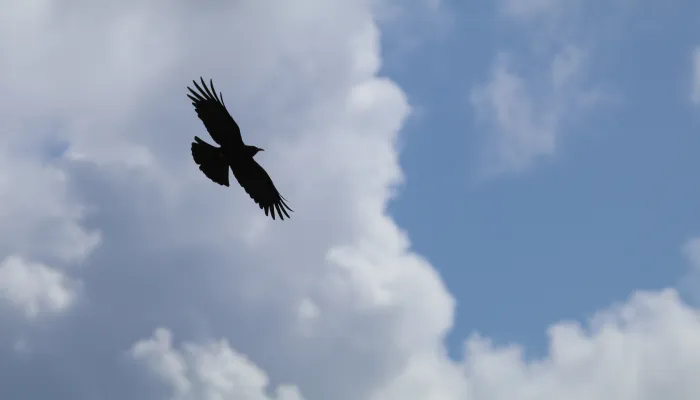
This winter, your generosity can reach new heights. 2025 will mark the third year of chough releases to the wild, but this will only be possible if we raise vital funds needed to support our next cohort of chough chicks.
That’s why we’re asking for your support to raise £50,000 by 31 January 2025. Your donations will help to feed our next cohort of chough chicks, cover the costs of hand-rearing, and provide a safe location, away from predators and the elements, so they can begin a thriving life in the skies of Dover.
Here’s your chance to get closer to Kent’s incredible Chough Reintroduction Project than ever before!
A select few lucky winners (and a guest each) will receive an exclusive behind-the-scenes tour, where you’ll:
This intimate, hands-on experience is truly one of a kind – and could be yours!
How does it work? Each £10 donation to our Chough Appeal gets you one entry into the raffle. That means a donation of £50 equals five entries! Already donated? Don’t worry – every £10 you’ve given already counts as an entry! Want to boost your chances? Donate more before 31 January to secure extra entries.
You can donate online through our Kent Wildlife Trust donation form below. Please note that this donation will not be match funded.
By donating through our partner GiveMatch and sharing your unique link with two friends, your original donation will be doubled by GiveMatch when your friends donate too, in any amount.
This means your impact can go even further for chough chicks this.
You can also send us a cheque with your donation to our Tyland Barn offices at:
Tyland Barn,
Sandling Lane, Maidstone
ME14 3BD
Please do remember to include 'chough' in your reference, or let us know that you'd like your donation to go towards this appeal. Thank you!
The red-billed chough was absent from Kent for 200 years due to persecution and habitat loss. But thanks to our supporters, these striking birds returned to Kent’s skies in 2023, a symbol of hope and resilience.
Now, to secure the future of these iconic species, we urgently need your support to rear the next generation of chough chicks. These charismatic birds are more than rare treasures of legend and folklore, with roots in Kentish history that stretch back to Thomas Becket and Shakespeare’s King Lear. Choughs are powerful symbols of our county’s heritage, and their presence helps protect our future too.
This winter, we have a critical opportunity to drive the Chough Reintroduction Project forward. Without the funds to raise and protect this new generation of chicks, we risk a break in the breeding programme – a gap that could set us back and jeopardise the future of Kent’s choughs. Please, don’t let their story end here. We want to keep these remarkable birds thriving in Kent’s skies, where they belong.
By donating today, you're not just giving a gift - you're securing a future for these remarkable birds.
Together, we've achieved incredible milestones:
2021: Our supporters helped us raise £60,000 to launch the Chough Reintroduction Project
2023: The first cohort of choughs were released into the wild, finding their way home to Kent's landscape and reclaiming their place in our skies
Over decades we have restored essential chalk grassland habitat to support the return of choughs to our skies, starting with Old Park Hill, safeguarding Nemo Down, extending Lydden Temple Ewell and restoring Combe Down.
Now, we turn to you. We are closer than ever to a self-sustaining population of choughs in our skies, but this crucial third year of reintroductions depends on your support.

Providing essential, nutritious food for growing chough chicks and breeding pairs, ensuring they stay strong and healthy in the aviary and rearing sites.
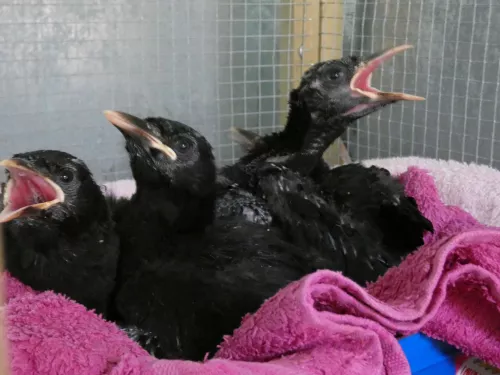
Funding specialised care to guide each chick through those critical early stages, offering them the best start in life.
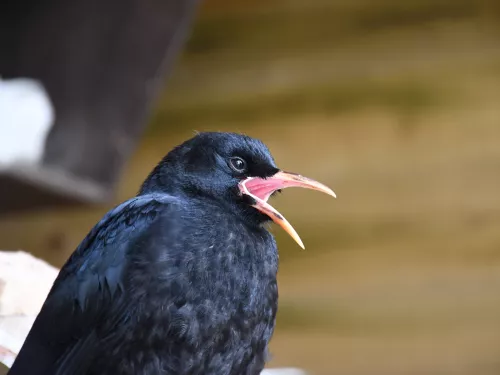
Maintaining and repairing the aviary to keep chicks safe from predators and the elements until they are fully fledged and ready for the wild.
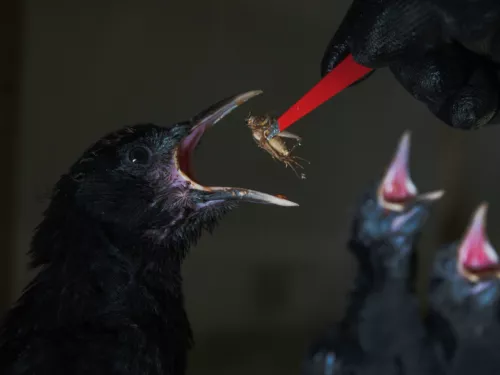
Supplying essential tools for our team to nurture chicks that need that extra support.
You have a unique opportunity for your support to go even further. Donate through our partner GiveMatch, alongside two friends, to double your donation.
Donations made using our usual channels won’t be match funded, but will still help us support chough chicks this Christmas.
You can donate through our regular donation form here.
Every pound raised will support the Chough Reintroduction Project, delivered in partnership by Kent Wildlife Trust, Wildwood Trust and Paradise Park.
By working in partnership, we can make a bigger difference. Kent Wildlife Trust owns and manages significant areas of land; Wildwood Trust brings expertise in conservation breeding and native species' reintroduction.
Chough chicks will be reared by the expert team at Wildwood Trust and Paradise Park for three months before they are ready to be released into the wild to settle and breed. We plan to release young choughs each year and support these birds to establish a self-sustaining wild population in Kent.
These birds will be prepared, as best as possible, for life in the wild. We will build a release aviary in a location which, for the birds’ welfare, will be kept private. Here, they will acclimatise to their new surroundings.
With the support of volunteers and state-of-the-art GPS trackers, we will closely monitor the choughs after release to ensure their welfare and track their progress. We will be able to see where they have settled and to check whether they are mating successfully, where they are nesting and monitor their success.
We've come so far, but we need your help to continue the journey. This winter, your donation can make a life-changing difference to the next generation of Kent's red-billed chough chicks.
The chough is the only member of the crow family with a red bill and red legs, which contrast strikingly with its black, glossy plumage. It is also the rarest member of the crow family in the UK, protected under UK and European Law.
Acrobatic in flight, it has a 'chee-ow' call which is similar to, but louder than, the Jackdaw's.
Choughs live on coastal cliffs and headlands, making chalk grassland in Dover their ideal habitat. They feed on insects, such as leatherjackets and dung beetle larvae that they dig from the ground with their long, curved beaks.
Choughs mate for life; pairs break away from groups whilst nesting but re-join the flock to forage for food in autumn and winter. They build their nests in small colonies on rock ledges and cliff faces, and even in abandoned buildings, such as the war time structures found along the White Cliffs. They use roots and twigs to construct their nests, before lining them with wool or animal fur. The female lays three to five eggs a year and both parents help to raise the chicks.
Wilder Kent is our vision for the restoration of nature in Kent, creating wildlife-rich landscapes and seascapes and returning our missing species to their rightful places. It is about reconnecting people to nature, and choughs, with their cultural significance can do exactly that.
With species extinctions taking place across the globe, and species populations plummeting in the UK, isn't it time we brought one back?
By returning this missing species to its former habitat we will drive future restoration of neighbouring areas and keep the momentum going for improving this landscape to tackle the biodiversity crisis we currently face. We hope the chough can also act as a symbol of what can be achieved if we work together to support wildlife and care for nature.
Sadly, chalk grasslands are now incredibly rare, but Dover remains a stronghold for this internationally important habitat.
A massive 50% of the world’s remaining chalk grassland can be found in England, and 2.5% of this within Dover.
Decades of chalk grassland work around Dover has created thriving spaces, teeming with colour and life, that now provide ideal habitat to support a wild population of chough.
This reintroduction forms part of a long-term vision to restore choughs across Southern England, involving other conservation organisations, including Paradise Park, Wildwood Trust, and Hampshire and Isle of Wight Wildlife Trust, to help secure the future of this iconic species and the habitats that support it.
These iconic birds feature strongly in the cultural history of our region; choughs can be found on pub signs and coats of arms throughout Kent. However, just as the chough was lost from our landscape, so too has its cultural significance been all but forgotten.
You may already know the story of Thomas Becket’s murder at Canterbury Cathedral, but did you know of his connection to the chough?
It is rumoured that as Thomas lay dying, a crow flew down and by paddling in his blood, acquired a startling red beak and feet, transforming into a chough.
Three choughs soon after featured on his coat of arms and, in the 14th century, the City of Canterbury included these birds, alongside the royal lion, on the city’s crest.
The chough’s connection to Dover was immortalised by William Shakespeare who wrote of these charismatic birds in ‘King Lear’. He describes ‘the Crowes and Choughes that wing the midway ayre’, at what became known as 'Shakespeare Cliff’.
We must raise money to fund the continuation of the chough restoration breeding programme. The programme relies completely on philanthropic donations and receives no government or statutory funding, all partners involved must apply for funding with no guarantee of success.
If we don’t raise the funds needed to continue the breeding programme, we will have to scale back the project. This will mean that any funds raised will go towards supporting the birds currently in our care, but we will not be able to continue working to secure a larger and more sustainable population.
As a charity, we rely on the generosity of our supporters, members, corporate partners and trusts and foundations. We run a maximum of four appeals per year, which always ask for funding support for the work we deem most at-risk. Sometimes this is to save a piece of precious habitat that is at risk of being developed, and sometimes this is to ensure a project that needs funding can continue to run.
While we usually leave more time between appeals, we had the opportunity to secure triple match funding between 1 – 14 December through our partner GiveMatch, and didn’t want to miss out on the opportunity to help generous donations go further.
GiveMatch is a fundraising platform that doubles your donations via the power of social sharing.
After you donate, you will receive a personalised link to share with friends. When two friends donate through your link, your donation is doubled by GiveMatch’s funding partners, doubling the impact of your donation to support chough chicks this Christmas.
From 15 December – 31 January, your donation will be doubled if you get two friends to donate to the appeal too via the unique link generated for you once you donate. If you donate £200, it unlocks another £200. If you donate £50, it unlocks another £50.
GiveMatch secures match funding from high-net-worth donors, corporations, foundations, celebrities, and government bodies. Once you qualify for a match, the funds are released from an escrow to your chosen charity.
No. The match funding is only released once you’ve successfully donated yourself and referred two friends who donate through GiveMatch. If this doesn’t happen, the match funding won’t be released to us, but we'll still receive your original donation.
You can also still donate through Kent Wildlife Trust using our own donation form, getting in touch or sending a cheque. Donations made using our usual channels won't be match funded, but will still help us support chough chicks this Christmas.
GiveMatch is a social fundraising platform, that means that to make your donation eligible to be matched, you must get two people to donate any amount using your link.
If two people don’t donate using your link, your donation still comes to Kent Wildlife Trust’s chough chick appeal but will not be matched.
However, if you’re struggling to get friends, family or colleagues to donate, you can contact [email protected] and we’ll help share your link.
No, your friends can donate any amount they choose. Their donations do not have to match yours. Once your friends donate, they too will receive a personalised link to share with their network and have their donation amount matched - starting a giving chain.
Yes. Up to £200 of your donation will be matched by GiveMatch once two of your friends have donated using your link. You can still donate over the limit - anything over £200 won't be matched but will still provide vital funds for chough chicks this winter.
Yes please! You can Gift Aid your donation to make it go even further. At no cost to you, Kent Wildlife Trust will be able to claim an extra 25% on top of your donated amount.
Gift Aid is not eligible for match funding.
100% of the funds donated by our supporters go directly to our 'Supporting chough chicks this Christmas' appeal.
Yes. After match funds have been received by Kent Wildlife Trust, GiveMatch will charge the charity a percentage of the matched fund amount. This means we still receive additional donations, and it's risk free for the charity as we don’t pay anything up front.